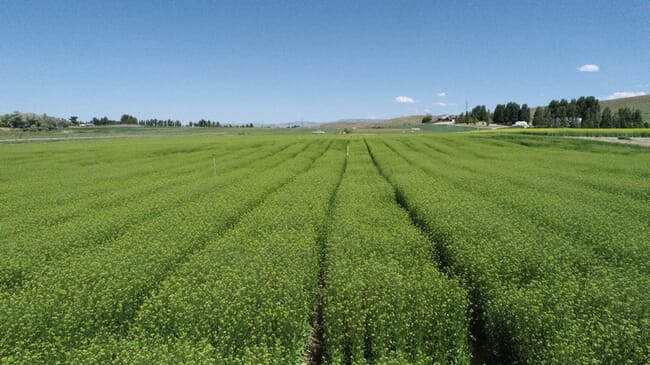
© Yield10 Bioscience
Yield10 Bioscience - an agricultural biotechnology company - has announced that approval has been granted by the United States Department of Agriculture Biotechnology Regulatory Services (BRS) for the growing and breeding of Yield10’s Camelina sativa varieties, developed using genetic engineering to produce omega-3 fatty acids.
Due to historical and continued overexploitation of wild fish populations, traditional fish oil sources are creating gaps in supply and driving the growing demand for new sources of omega-3. By utilising Camelina as a land-based production platform, Yield10 aims to provide a new, reliable supply for omega-3 fatty acids, which can supply the aquaculture industry, and other consumers, whilst reducing their environmental impact.
The Camelina oil produced by Yield10 contains approximately 10 percent eicosapentaenoic acid (EPA) and 10 percent docosahexaenoic acid (DHA), resembling the omega-3 profile of traditional fish oils and making the product potentially suitable as a replacement in products where fish oils are currently used.
Global markets for omega-3 fatty acids include aquafeed used for the farming of salmonids and other high-value fish, pet feed, baby formula, and nutraceutical and pharmaceutical products. Currently most omega-3 fatty acids used in these products are sourced from ocean-caught fish.
“This regulatory milestone represents a critical step for enabling the ramp-up of Camelina planting to commercial scale in the US for producing omega-3 oil for key markets including aquafeed and human nutrition,” said Dr Kristi Snell, chief science officer of Yield10 Bioscience, in a press release announcing the progress.
However, whilst Snell outlines Yield10’s plans for the progress of the Camelina omega-3 production, they acknowledge that its use in aquafeeds and other products may face further regulation.
“In 2024, we plan to focus on executing our development program, building seed inventory in anticipation of commercial scale planting, and engaging with potential commercial partners to enable future commercial sale of omega-3 oil and meal in target markets. Use of omega-3 oil and meal in target markets may still be subject to regulation from other regulatory authorities in target geographies,” they explained.
Having already signed a Letter of Intent with the aquafeed producer BioMar, Yield10 aims to work towards growing this relationship in 2024, with the goal of producing a Camelina crop containing enriched levels of EPA and DHA equal to fish oil for the production of alternative aquafeed ingredients on a commercial scale.




